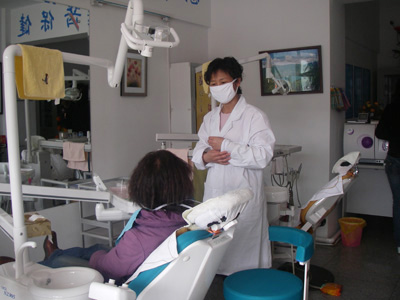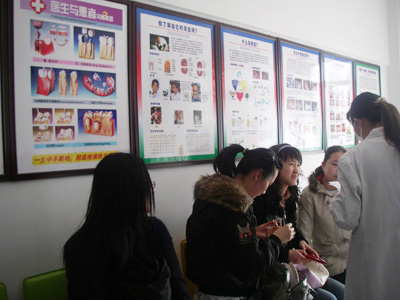| Home / Living in China / Expat Tales | Tools: Save | Print | E-mail | Most Read |
| Dr. Liu and Her Fabulous New Mouth Dental Clinic |
| Adjust font size: |
Going to the dentist in northern China did much more than fix my teeth: it opened my eyes to some stark differences between North American and mainland Chinese cultural paradigms and dental practices.
The first obvious difference is price. Dental work is astoundingly affordable. Dental clinics abound here in Hohhot, Inner Mongolia, where I've lived since 2004 teaching English and Russian. I sought out a dentist last week when an upper filling partially chipped and fell out during lunch one afternoon. Luckily, my best friend, a 45-year-old Buryat woman, Irineshka Zhargul, immediately escorted me by bicycle to a nearby dental clinic. "It's great," she assured me, "I took my son Yura there to pull out one of his ingrown baby teeth." Together we pushed open the sliding glass door and peered inside. Dr. Liu, the owner and head dentist, was sitting at her desk reading an outdated dental journal. She cheerfully greeted my friend and then waved me into one of her new, high tech chairs. "You need a crown," the petite dentist announced a few minutes later, after peering into my mouth and probing delicately with her pick. "When do you want to do it?" "Uh," I muttered, floundering, "How much will it cost?" "We have different prices," she explained. "Ranging from 150 yuan (US$20) to as much as 2,000 yuan (USD$260). I'd advise a middle of the road price. It will last several years, look good and give you no problems." "Okay," I replied, "How about the 600 yuan (US$75) crown? I'll come back in a few days, okay?" "Sure," she responded. "Here, take this tray: it's your own personal dental tools. Write your name on it. I'll keep it here until you decide to return. That tray costs 5 yuan (65 cents). Please pay me now." I paid. Then I decided to prepay for my 600 yuan crown as well -- more for myself than for her. I'm actually terrified of dentists and doctors. Only already turned over cold cash will convince me to come back. But come back I did, and on a Sunday afternoon. Dentists in China work seven days a week. Doctor Liu had informed me that she regularly put in ten hour days, not just to pay off all her bills but as a matter of course in order to provide convenient office hours for her patients. "How long have you had this practice?" I asked her. "Just seven months," she answered. "I work with my husband. My spouse helps me with customer service. He puts bibs on patients, gives them each a hand mirror, and sterilizes stuff for me. He pays bills and employees. I also have two helpers. They can do most of what I do -- we are equals. Actually, they are my former classmates but only I had enough money to start up the business so they work for me. I borrowed about 100,000 yuan (US$15,000) from my good friends, not from a bank. Success has arrived but I'm still sending in monthly payments for my three chairs; each costs 20,000 yuan (US$2500)." I nodded, appreciative of the beautiful little work area Dr. Liu had created. Her prices were slightly higher than a neighboring clinic but the hygiene and aesthetics were well worth the extra cost. Chinese patients pay cash for services rendered immediately after receiving them. Each service and/or product is itemized and the patient is free to choose several options and prices. I watched as an assistant worked on a ten-year-old boy, first giving him an optional shot of anesthesia (15 yuan -- US$2), then taking a quick X-Ray of his ingrown tooth (20 yuan -- US$2.5). Finally she worked patiently with pliers to loosen and pull out the faulty tooth (10 yuan). Upon my return a few days later I received my prepaid 5 yuan tools and then agreed to an optional pain shot. Then an assistant took an X-Ray using the small machine in the corner by the door. She gave me no lead guard, held the film with her finger and zapped everything. Two minutes later Dr. Liu peered at the picture, and then she began drilling. First she ground down my faulty molar with a kind of sandpaper in order to get ready to cap it. When she finished her tasks instead of applying a temporary crown she smeared the rough surfaces with a protective coating and sent me home. "Come back after Friday," she stated. "You'll get a temp on your return. If you have any pain you can come back sooner." This lack of set appointments, the inability to choose a specific dentist, and multiple tasking I watched all three dentists perform, all represent notable cultural differences between China and the West. Here in China patients simply show up, sit and take the doctor allotted, unless the problem happens to be very specific. In the US and Canada I waited for weeks, even months to see my dentist. Moreover, here a client's entire dental history and problems are on public display; in the West we value our privacy. Sending dental records resembles espionage at times. Chinese have less need for privacy. Everyone in the office, from patients, family members, and even passersby, all are free to watch if not step near the dental chair and comment on your treatment. It's a bit unnerving at first but after three years in China I actually find it reassuring. For the most part people are alert, friendly and sympathetic, rather than gawking.
Significantly, no one in China ever goes to a doctor or a dentist alone. It is a social affair, with the more the merrier. Family members stand around to show their loyalty and affection to the stricken relative, and to be on call in case anything is needed. I was the only person who came alone. In fact, out of a sense of duty several students came with me on my second and third visits to show their respect toward me as a teacher more than to help with translations. Another notable difference is the sound inside a dental office. It is as quiet as a library. Dentists do not gossip mindlessly over your trapped form to each other. Clients do not talk, whine or cry. They even spit quietly. Normally garrulous family members rarely speak and if they do they whisper. Fixing teeth is serious and expensive business. As I lay in the dental chair receiving treatment only the sound of all three drills whining reverberated in the room. No piped music floated in the air. Dr. Liu's entire office consists of one small open room with a plate glass window facing the street and sliding glass doors. White walls, lots of live plants and big blue Chinese characters adorned the room. The waiting space offered no magazines so I was reading the slogans to practice my Chinese. "That slogan says 'We build strong teeth' and that one states 'Our dentists are of high moral virtue and good quality'," whispered Shirley Li, my devoted student, as we waited for my third and final visit. The clinic was packed. We gazed around the room, commenting on the pretty interlaced bamboo plants, the ten educational posters (in elementary Chinese) and the sense of cleanliness and well being in the room. "There is her price list," Shirley commented, pointing to the wooden desk where a paper had been taped. I read: cavity fillings 40-60-80 yuan; fake teeth, leave in 30-40-50; fake teeth, removable 100-200 yuan; pull tooth, 15 yuan; dentures for elderly 300-1200 yuan; and braces 2000 yuan and up. We patiently waited. Today all three dentists were currently occupied. Seven clients sat, including me. "Dr. Liu sure is popular," I remarked, watching her press the drill pump on the floor with her fashionable stiletto heels. The diminutive dentist wore no makeup or jewelry but obviously was raking in cash. "She dreamed of being a dentist since childhood," a plump matron next to me quietly remarked. "She told me her mother had terrible teeth, and she wanted to help her mother. She fixed her mom's teeth for free." "Good teeth are symbols of success now in China," added Shirley. "Just like in the Western countries." "How much schooling does a dentist need here to start a clinic?" I inquired. "Dr. Liu went to a special dental vocational school just for a year. It's not like the West, where you go for years and years. This school teaches practical application. Besides, every good dentist goes to refresher courses each year to learn new techniques, and there are ways to exchange ideas." I nodded, wondering what these methods were, since no computer sat near the desk where people paid for services. The office seemed small, about 14x20 square feet. We sat propped against one wall, watching the three dentists working on patients in the three chairs. A large 12 foot by 8 foot mirror hung on the opposite wall, creating an illusion of more space and giving the patients a way to watch the dentists as well. The room smelled slightly of medicinal herbs and iodine and soap. "Does she own this building or rent?" I asked one of the two efficient assistants. "We rent," she replied primly. "It's about 1000 yuan a month, but the doctor lives right across the way so it's convenient for her to walk to work." "What about other overhead?" I probed. "Taxes, liability insurance, interest rates?" "Pretty low," Dr. Liu interjected. "I pay about 500 yuan to the government for special liability but no one has ever made a complaint. And my friends do not charge me interest on my loan. I have no student debts; only my equipment. I'll be debt free in a few years." "What kind of profit do you accrue?" I curiously inquired. "I'd rather not say," she smiled back. "But it is certainly not the money Western dentists make. I work long hours, granted with my husband here too, but I earn less money than any Western professional would agree to. The work suits me. I am serving my country as well as acting as a small business owner." She grinned and her eyes lit up, and then rolled herself back to peer inside an elderly grandmother's mouth. (China.org.cn by Valerie Sartor, April 5, 2007) |
| Tools: Save | Print | E-mail | Most Read |
 |
| Related Stories |
|

